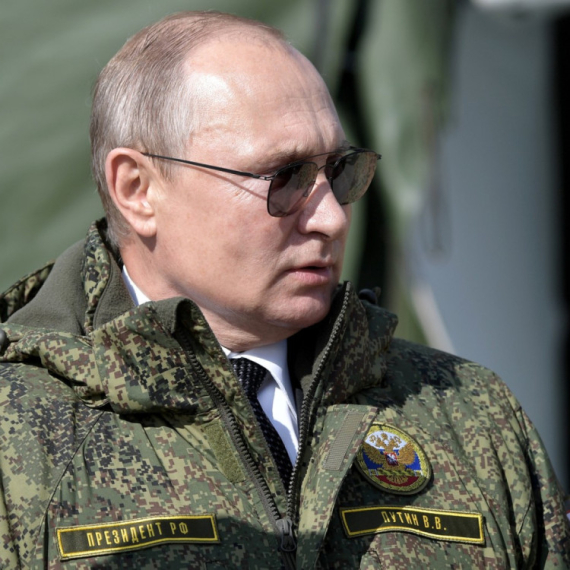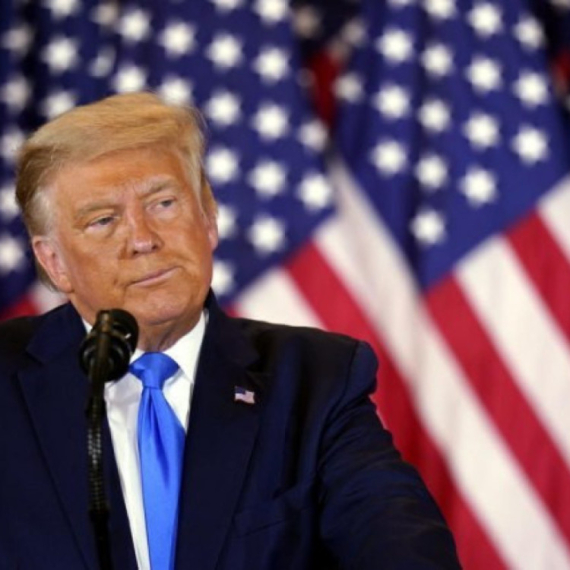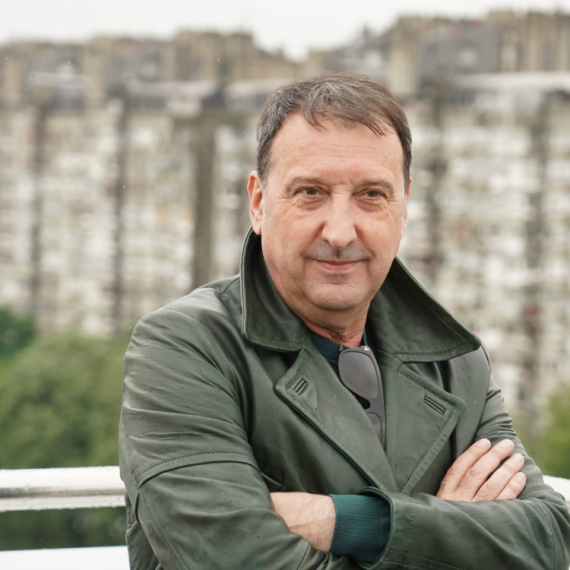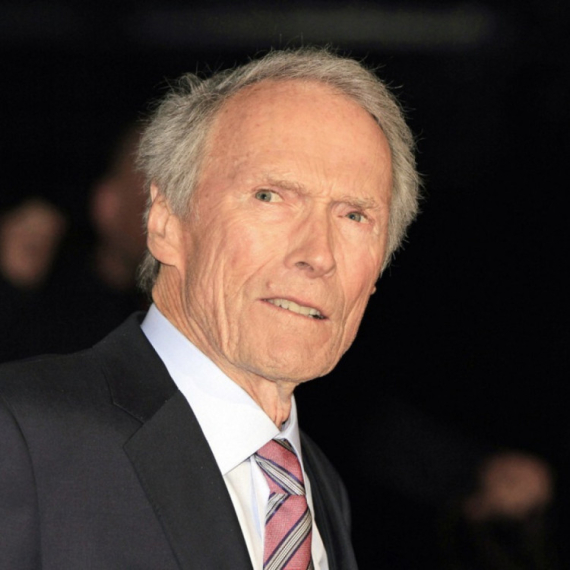Ban on Pride Parade not defeat but victory, PM says
Serbian PM and Interior Minister Ivica Dačić said late Wednesday that the ban on the gay Pride Parade was not a defeat for Serbia, but rather a victory.
Thursday, 04.10.2012.
09:52

BELGRADE Serbian PM and Interior Minister Ivica Dacic said late Wednesday that the ban on the gay Pride Parade was not a defeat for Serbia, but rather a victory. When asked whether the ban on the gay pride march represented Serbia's defeat, Dacic said it did not and that it was rather a “victory for Serbia,” adding that “Saturday will be a quiet day.” Ban on Pride Parade not defeat but victory, PM says During a reception that Germany's Ambassador to Serbia Heinz Georg Wilhelm hosted at the residence to celebrate the Day of German Unity, the Serbian PM said that he would rather accept criticism for the decision to ban the parade than to see any victims on that day in Belgrade. Dacic said that “nobody will be telling anyone what should happen in Belgrade, be it the EU or any of the countries of the world, or any extremist or radical organization.” The Serbian authorities decided on Wednesday to ban the Pride Parade that was supposed to be held on October 6 due to security reasons. Secretary General of the Council of Europe (CoE) Thorbjorn Jagland has voiced his surprise and disappointment over the fact that the Pride Parade in Belgrade had been banned once again. “Citizens should be able to exercise their rights to the freedom of assembly and freedom of expression. Serbia should be in a position to safeguard such an event, which is commonplace is modern democracies,” Jagland issued a release on Wednesday evening. “The U.S. is very disappointed with the Serbian government's decision to ban the Belgrade Pride Parade once again,” the U.S. Embassy in Belgrade stated on Wednesday evening. Intimidated by the threats of violence, the Serbian government has missed a chance to demonstrate its commitment to the defense of rights of all citizens of Serbia, reads a statement to Tanjug. The right to the freedom of assembly is a very important right in all democratic societies, and the governments are due to secure free and peaceful assemblies, at which citizens can publicly voice their views, and associate with others. These rights are fundamental, and they should not be breached. We have said this to the Serbian authorities on a number of occasions, the embassy's statement reads. The U.S. believes that that it is greatly important to protect human rights and basic freedoms of all people, including the LGBT population worldwide. As said by U.S. Secretary of State Hillary Clinton - the rights of the LGBT population are human rights, and human rights are the rights of the LGBT population. The human rights refer to all people, cultures, and traditions, the statement reads. Ivica Dacic (Tanjug, file) “Europe concerned over Pride Parade ban” “Pride Parade is not a precondition for Serbia's EU integration, but Europe is worried that the event has been cancelled for security reasons for the second year in a row,” Head of the EU Delegation in Serbia Vincent Degert stated on Thursday. “The signals sent by those who promote violence are worrying, and they have even managed to achieve their goal (ban of Pride Parade),” Degert told reporters. “If a group can use threats and violence to prevent others from realizing their rights, then we have a problem in the society,” he said, adding that it referred to the LGBT population today but that tomorrow it could be any other minority issue. “It is not good to promote violence instead of dialogue and tolerance,” Degert pointed out. He noted that a few months ago Pride Parade had been held in the Croatian town of Split without any of the problems it had in the past. “Today it appears that this can be done without threats and violence and for this reason I believe that it can be done this way in Serbia as well. I hope that maybe next year we will manage to avoid this kind of situation,” Degert concluded. EU Enlargement Commissioner Stefan Fule has called for a probe into threats against Pride Parade participants. “The EU is sorry about the decision of the Serbian authorities not to allow the Parade,” Fule’s Spokesman Peter Stano told a press conference on Thursday. He said that Fule had been carefully monitoring the situation through regular contacts with the Belgrade authorities, EU High Representative for Foreign Affairs and Security Policy Catherine Ashton and MEPs. “Fule strongly condemns threats against parade participants and points out that they were serious enough to ban the Pride Parade,” Stano added. Tanjug
Ban on Pride Parade not defeat but victory, PM says
During a reception that Germany's Ambassador to Serbia Heinz Georg Wilhelm hosted at the residence to celebrate the Day of German Unity, the Serbian PM said that he would rather accept criticism for the decision to ban the parade than to see any victims on that day in Belgrade.Dačić said that “nobody will be telling anyone what should happen in Belgrade, be it the EU or any of the countries of the world, or any extremist or radical organization.”
The Serbian authorities decided on Wednesday to ban the Pride Parade that was supposed to be held on October 6 due to security reasons.
Secretary General of the Council of Europe (CoE) Thorbjorn Jagland has voiced his surprise and disappointment over the fact that the Pride Parade in Belgrade had been banned once again.
“Citizens should be able to exercise their rights to the freedom of assembly and freedom of expression. Serbia should be in a position to safeguard such an event, which is commonplace is modern democracies,” Jagland issued a release on Wednesday evening.
“The U.S. is very disappointed with the Serbian government's decision to ban the Belgrade Pride Parade once again,” the U.S. Embassy in Belgrade stated on Wednesday evening.
Intimidated by the threats of violence, the Serbian government has missed a chance to demonstrate its commitment to the defense of rights of all citizens of Serbia, reads a statement to Tanjug.
The right to the freedom of assembly is a very important right in all democratic societies, and the governments are due to secure free and peaceful assemblies, at which citizens can publicly voice their views, and associate with others. These rights are fundamental, and they should not be breached. We have said this to the Serbian authorities on a number of occasions, the embassy's statement reads.
The U.S. believes that that it is greatly important to protect human rights and basic freedoms of all people, including the LGBT population worldwide. As said by U.S. Secretary of State Hillary Clinton - the rights of the LGBT population are human rights, and human rights are the rights of the LGBT population. The human rights refer to all people, cultures, and traditions, the statement reads.
“Europe concerned over Pride Parade ban”
“Pride Parade is not a precondition for Serbia's EU integration, but Europe is worried that the event has been cancelled for security reasons for the second year in a row,” Head of the EU Delegation in Serbia Vincent Degert stated on Thursday.“The signals sent by those who promote violence are worrying, and they have even managed to achieve their goal (ban of Pride Parade),” Degert told reporters.
“If a group can use threats and violence to prevent others from realizing their rights, then we have a problem in the society,” he said, adding that it referred to the LGBT population today but that tomorrow it could be any other minority issue.
“It is not good to promote violence instead of dialogue and tolerance,” Degert pointed out.
He noted that a few months ago Pride Parade had been held in the Croatian town of Split without any of the problems it had in the past.
“Today it appears that this can be done without threats and violence and for this reason I believe that it can be done this way in Serbia as well. I hope that maybe next year we will manage to avoid this kind of situation,” Degert concluded.
EU Enlargement Commissioner Stefan Fule has called for a probe into threats against Pride Parade participants.
“The EU is sorry about the decision of the Serbian authorities not to allow the Parade,” Fule’s Spokesman Peter Stano told a press conference on Thursday.
He said that Fule had been carefully monitoring the situation through regular contacts with the Belgrade authorities, EU High Representative for Foreign Affairs and Security Policy Catherine Ashton and MEPs.
“Fule strongly condemns threats against parade participants and points out that they were serious enough to ban the Pride Parade,” Stano added.


































Komentari 64
Pogledaj komentare